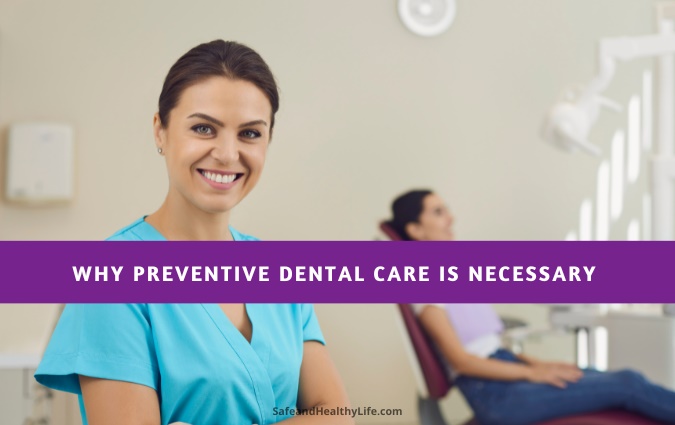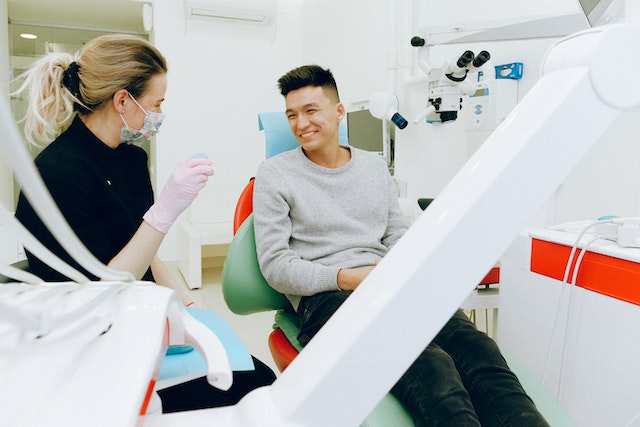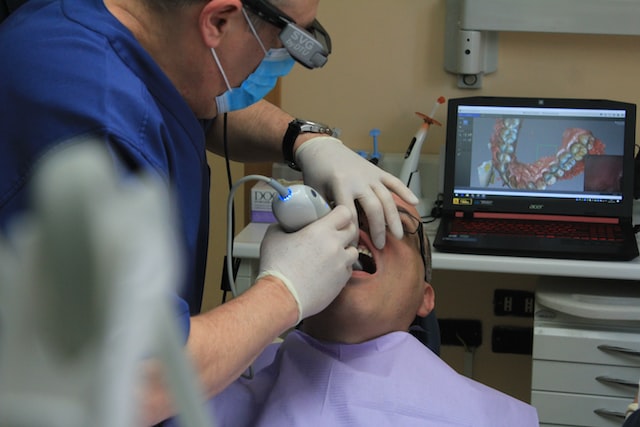Why Preventive Dental Care Is Necessary

A healthy smile is important to your overall self-confidence, but also a critical component of your overall health.
When your teeth are functional and teeth and gums are healthy, you can chew your food properly to aid in digestion and even thwart the risk of certain health conditions.
Preventive oral care is a fundamental part of protecting your teeth and keeping a healthy smile for years to come.
First, a Closer Look at Preventive Dental Care
Essentially, preventive dental care is all about preventing dental problems from occurring. Preventive dental care is a combination of good hygiene habits and dental care, and the earlier in life preventive care starts, the more protected the teeth will be.
Good prevention starts at home with good oral hygiene practices such as brushing and flossing but should also involve a qualified dentist.
Preventive dental care with the dentist involves the following services:
- Oral health checkups about every six months
- Routine oral hygiene appointments for teeth cleaning twice a year
- Routine x-ray examinations to look for invisible oral problems
- Fluoride treatments
- Dental sealants to protect molar surfaces prone to decay
- Space maintainers when children are transitioning from baby teeth to adult teeth
- Nightguards to prevent excessive tooth wear due to grinding
- Bite evaluation and orthodontic treatment referrals
A routine dental checkup is the hallmark of preventive care. During this evaluation, the dentist evaluates all aspects of oral health, including alignment, tooth wear, signs of decay, soft tissue health, and more.
However, oral hygiene appointments are just as important to remove plaque and tartar in areas of the mouth that are difficult to clean with regular brushing and flossing.
The Importance of Preventive Dental Care

Photo Credit: Pexels
Preventive dental care is absolutely necessary to maintain good oral health.
Even if you follow good oral hygiene habits at home, working with the dentist for regular oral health exams and cleanings offers the most effective level of prevention.
Take a look at a few reasons why preventive dental care is necessary for people of all ages.
Lower the Risks of Tooth Decay
Tooth decay is the biggest reason for tooth loss, but preventive care can ensure problems with tooth decay are both negated and mitigated quickly.
Tooth decay develops due to an accumulation of acidic bacteria that collects on the enamel surface of a tooth in the form of plaque or tartar.
As this material sits idle, it breaks down the tooth enamel and leads to decay. With preventive care, plaque and tartar are removed regularly, which lowers the risks of decay.
Even the slightest spots of decay can be treated quickly to prevent it from spreading.
Reduce the Risks of Gum Disease
Gum disease (periodontitis) is a type of infection that affects the soft tissues that surround your teeth. While gum disease can be associated with certain illnesses, it is directly related to poor oral hygiene habits and a lack of preventive dental care.
Unfortunately, gum disease can lead to bone loss, which causes the teeth to get loose and may lead to necessary extractions.
Gum disease may even mean you are up to three times more likely to experience a cardiac event.
Promote Good Oral Hygiene

Photo Credit: Pixabay
Good oral hygiene is truly important. When you follow a good preventive dental care plan, you naturally work to keep the mouth hygienic.
By brushing, flossing, and using mouthwash as you should, you keep levels of bacteria in your mouth at a healthy level.
This can mean less of a chance of oral health problems, but also reduced risks of bad breath (halitosis), oral infections, and more.
Identify Oral Health Issues Early
The earlier oral health problems are recognized, the faster they can be treated. Early diagnosis and treatment of certain conditions can mean everything to your oral health and your smile.
For example, if a dentist spots signs of teeth grinding during a routine exam, a mouthguard can be prescribed to prevent further wearing of your teeth.
Not only does preventive care mean small issues are less likely to evolve into major problems, but also that costs associated with extensive treatments can be reduced — it’s much less expensive to treat a tiny cavity than to restore an entire tooth with root canal therapy and a crown.
Reduce Dental Problems Related to Certain Medical Conditions

Photo Credit: Unsplash
A number of chronic illnesses and conditions are known to negatively affect oral health. For instance, people with diabetes have a high risk of gum disease.
Likewise, certain types of cancer treatment may have negative effects on your teeth and heighten the risk of tooth decay.
By working closely with your dentist with a good preventive care plan, you have professional eyes on these issues so problems can be managed as quickly as possible.
Good Oral Health Starts With Early Prevention
Your teeth serve such an important purpose: They are part of your appearance and how you interact with the world through expressions and speech.
However, they are also valuable in terms of bodily function and health. Unfortunately, tooth loss is incredibly common, but a good preventive dental care plan makes all the difference.
You can do your part at home with good habits, but involving a good dentist in prevention is the true key to keeping your smile healthy for as long as possible.
About The Author:
Dr. Stephen Wallace is the owner of Stephen Wallace DDS, a dental office that focuses on oral health care with an emphasis on patient care. He has 26 years of experience in the industry and focuses on all aspects of dental care.
Sources:
https://www.nhs.uk/conditions/tooth-decay/
https://www.health.harvard.edu/heart-health/gum-disease-and-heart-disease-the-common-thread
https://www.cancer.gov/about-cancer/treatment/side-effects/mouth-throat/oral-complications-pdq
https://www.cigna.com/knowledge-center/what-is-preventive-dentistry
https://www.deltadental.com/us/en/protect-my-smile/oral-health-habits/preventive-dental-care.html
https://www.humana.com/dental-insurance/dental-resources/preventive-dental-care
https://www.health.harvard.edu/heart-health/gum-disease-and-heart-disease-the-common-thread
https://www.cancer.gov/about-cancer/treatment/side-effects/mouth-throat/oral-complications-pdq

